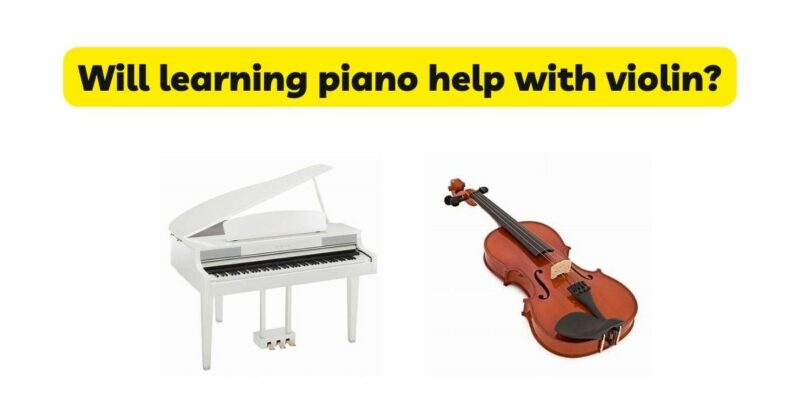When it comes to musical education, the benefits of learning multiple instruments cannot be overstated. As a violinist, expanding your musical horizons by learning the piano can bring about numerous advantages that enhance your overall musicianship. In this article, we will explore the symbiotic relationship between piano and violin, highlighting how learning the piano can complement and improve your skills as a violinist.
- Musical Theory and Notation: One of the significant advantages of learning the piano as a violinist is the enhanced understanding of musical theory and notation. The piano provides a visual representation of music theory, with its linear layout of keys and clear visual patterns. By studying the piano, you can develop a deeper understanding of scales, chords, intervals, and harmonies, which can be directly applied to your violin playing. The piano’s structure allows for easy visualization of music theory concepts, making it an excellent tool for grasping complex musical ideas.
- Sight-Reading and Rhythm: Another area where learning the piano can greatly benefit violinists is in sight-reading and rhythm skills. The piano’s layout provides a clear visual representation of both melody and harmony, which can aid in developing a strong sense of sight-reading. As you practice reading and playing piano sheet music, you’ll become more adept at recognizing patterns, intervals, and chord progressions, translating to improved sight-reading abilities when you return to the violin. Additionally, the piano’s percussive nature and its requirement to coordinate both hands foster a solid sense of rhythm, which can enhance your overall musicality and timing as a violinist.
- Ear Training and Intonation: Playing the piano can significantly contribute to your ear training and intonation skills as a violinist. The piano’s fixed pitch nature allows you to develop a keen sense of relative pitch, as you consistently hear and reproduce accurate intervals and harmonies. This improved ear training can help you develop a more precise and accurate intonation on the violin, enabling you to play in tune with greater confidence and accuracy. The ability to internalize and reproduce pitches from the piano can also assist in developing a strong sense of tonal memory and pitch recognition.
- Expressiveness and Musical Phrasing: Learning the piano can enhance your expressiveness and musical phrasing as a violinist. The piano’s expansive range and polyphonic capabilities allow for greater exploration of dynamics, articulation, and musical nuances. By studying piano repertoire, you can gain insights into how to shape melodies, create expressive phrases, and convey emotions through music. These concepts can be transferred and applied to your violin playing, enabling you to infuse your performances with a heightened level of expressiveness and musicality.
- Ensemble Playing and Collaboration: The ability to collaborate and play in ensembles is a valuable skill for any musician. Learning the piano opens up opportunities to play in various musical settings, including chamber music, bands, and orchestras. As a violinist, understanding how the piano interacts with other instruments and functions within an ensemble can greatly improve your ensemble skills. By gaining firsthand experience on the piano, you’ll develop a deeper appreciation for different musical roles, learn how to accompany other musicians, and enhance your ability to blend with other instruments.
- Compositional and Improvisational Skills: Learning the piano can ignite your creativity and expand your compositional and improvisational skills. The piano’s layout makes it an ideal instrument for experimenting with chords, progressions, and melodies. By exploring composition and improvisation on the piano, you can gain a better understanding of musical structure, develop a personal musical language, and explore different genres and styles. These skills can be transferred to your violin playing, enabling you to compose your own music, improvise solos, and add personal touches to existing repertoire.
Conclusion: In conclusion, learning the piano as a violinist offers a myriad of benefits that can significantly enhance your overall musicianship. From improved understanding of music theory and notation to enhanced sight-reading and rhythm skills, the piano provides a valuable foundation that complements and strengthens your violin playing. Additionally, the piano’s influence on ear training, expressiveness, ensemble playing, and compositional skills further expands your musical abilities. By embracing the piano alongside your violin studies, you can unlock new dimensions of musicality, creativity, and enjoyment, ultimately becoming a more versatile and well-rounded musician.


